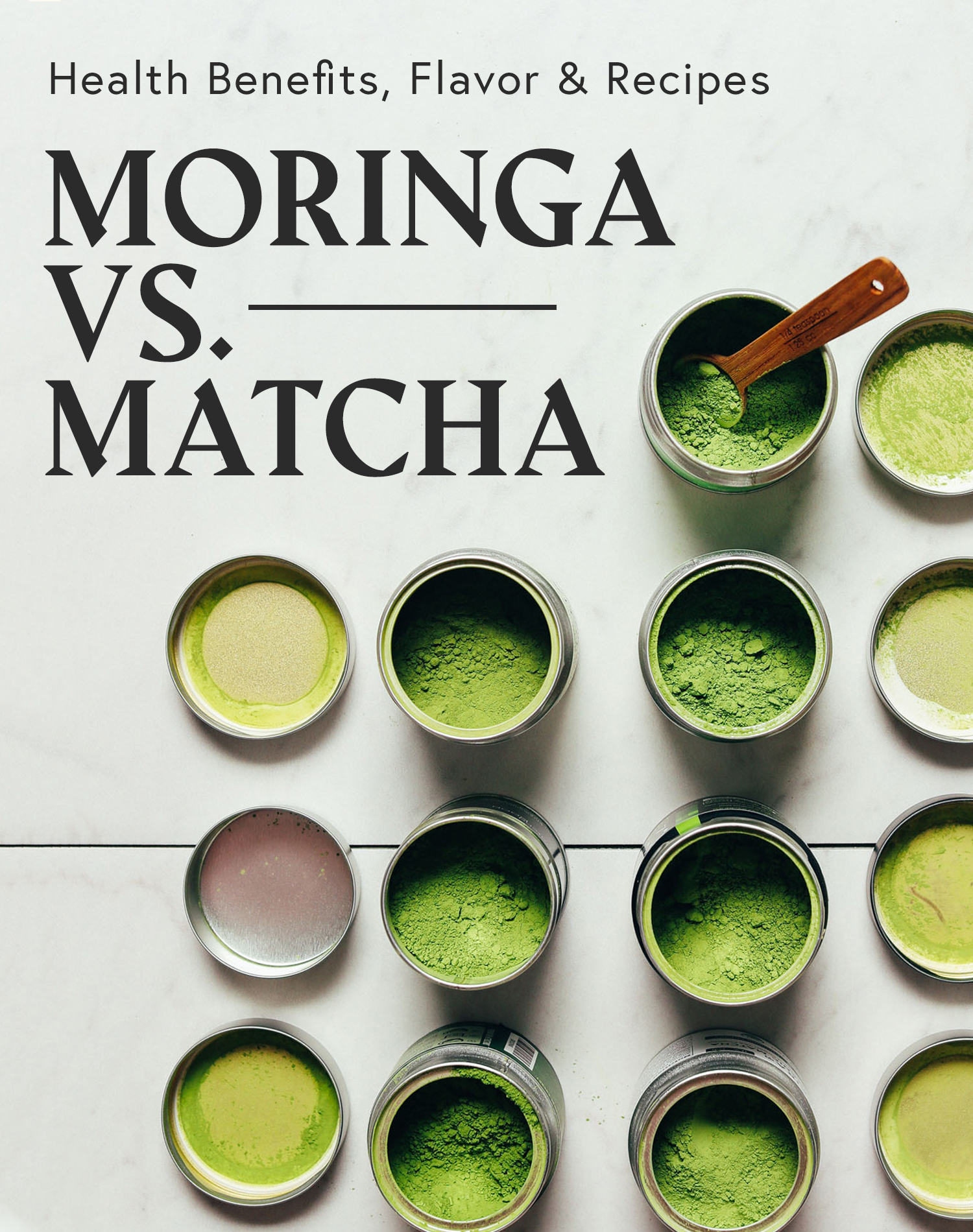
Matcha and moringa are two of our favorite superfoods. Why? They’re antioxidant-packed, boast some serious health perks, and can be made into super cozy morning beverages (matcha latte and moringa latte). They can even be used together to create a “half-caff” latte since moringa is caffeine-free.
Matcha vs. Moringa
While matcha was our first love, moringa more recently stole our hearts. Here’s why.
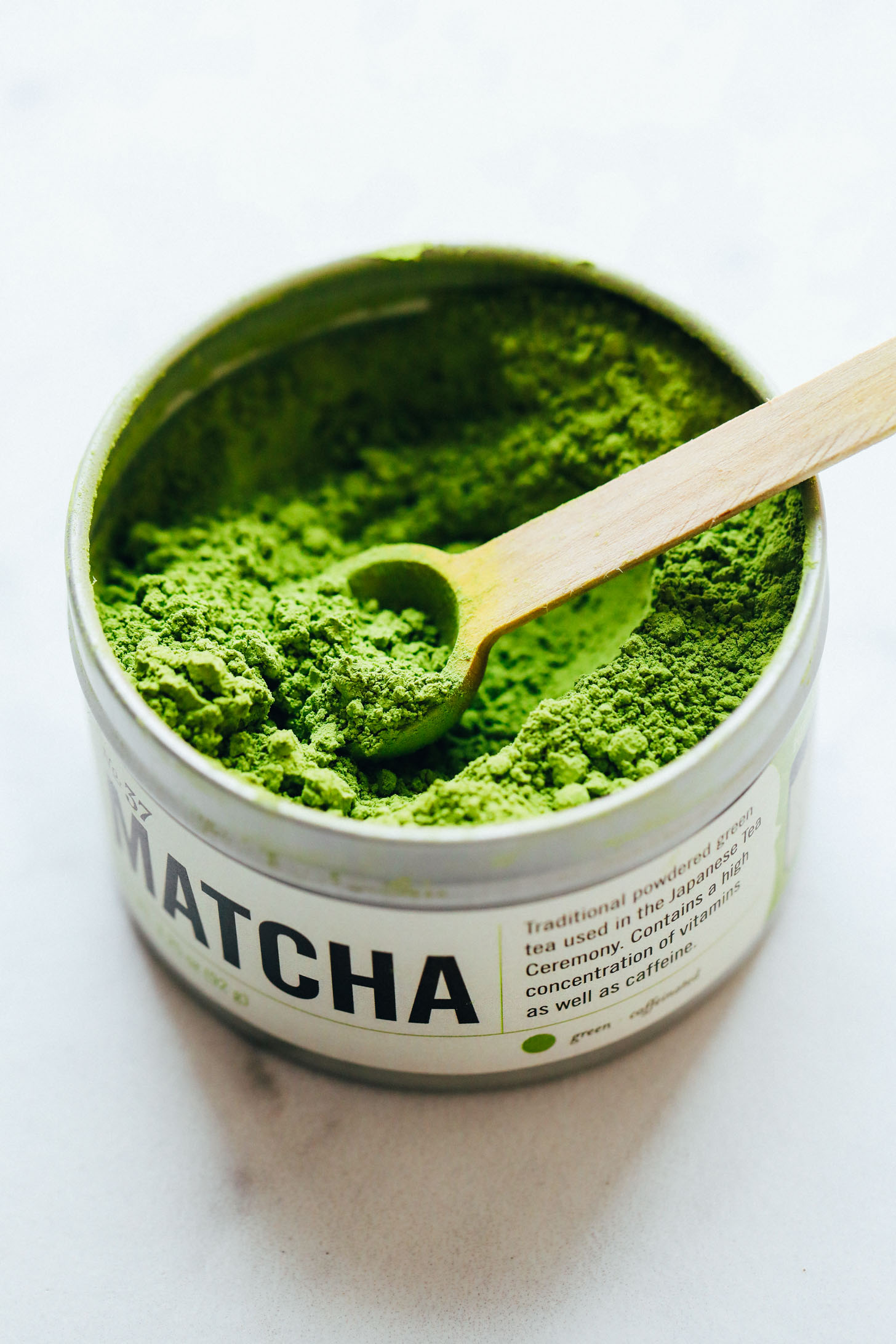
Matcha
Matcha has a rich, grassy, slightly floral and sweet flavor (depending on the quality — see our full guide to the Best Matchas here). It contains 137 times more antioxidants than brewed green tea (like, whoa). Both matcha and brewed green tea come from the tea plant (camellia sinensis), but with matcha, the entire leaf is consumed.
It has traditionally been consumed as part of Japanese tea ceremonies. You can learn more about matcha’s fascinating history here.
Health Benefits of Matcha
Research suggests that green tea supports brain health and has anti-cancer, anti-diabetes, and anti-inflammatory effects. And we’ve already established that matcha is even more potent than green tea!
It’s rich in vitamin C, the calming amino acid L-theanine, and a flurry of antioxidants (most notably, the powerful EGCG).
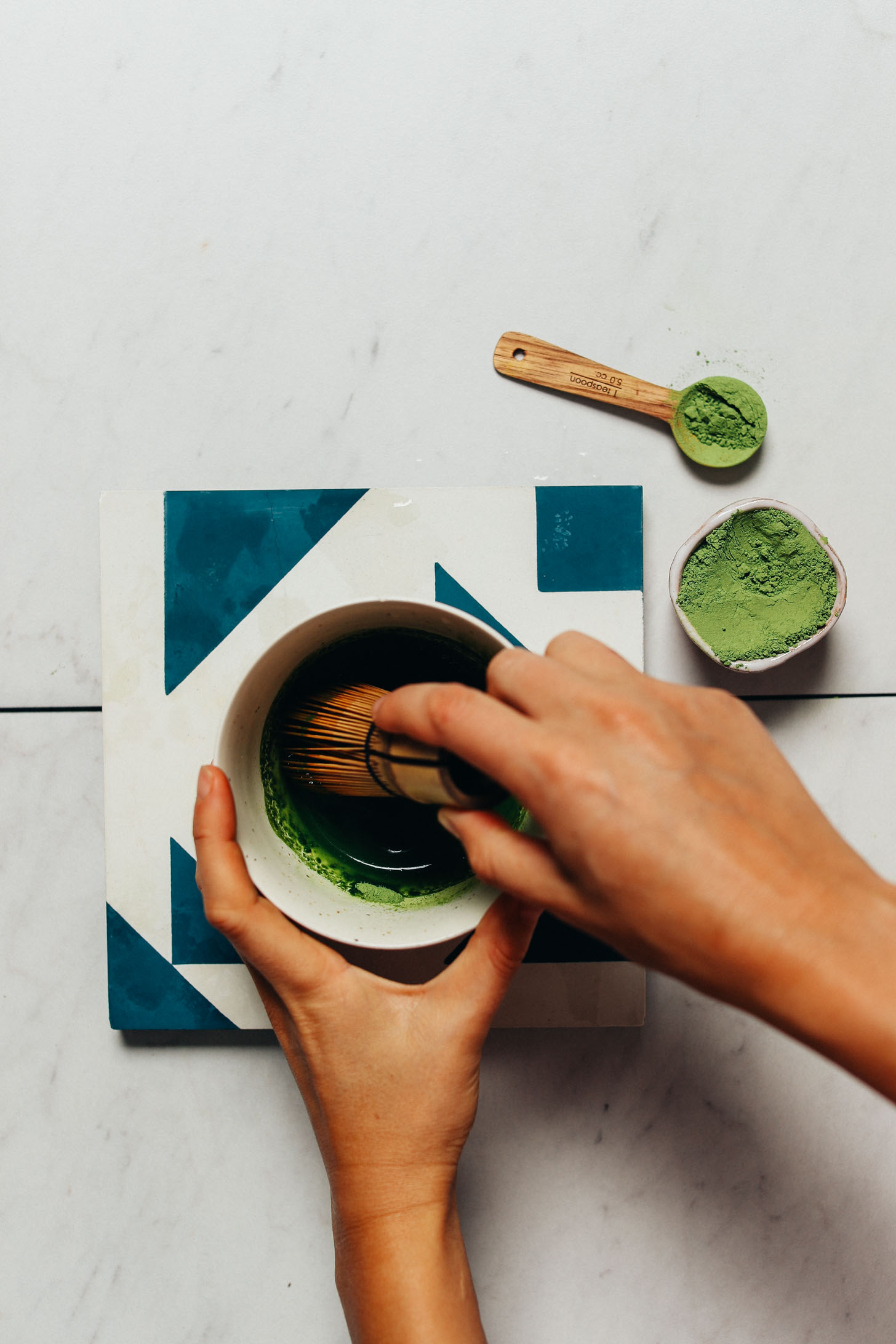
Moringa
Known as the “miracle tree,” moringa is native to India and also grows in Asia, Africa, South America, and beyond! It’s part of a family called Moringaceae, which is classified in the order Brassicales alongside cruciferous veggies like broccoli and cauliflower.
Moringa leaves can be consumed in salads, stews, and beyond, but more commonly you’ll find moringa available in powdered form (our preferred). Moringa is also grassy and earthy in flavor, but it’s slightly more spicy and less floral/aromatic than matcha.
Health Benefits of Moringa
Moringa is rich in nutrients such as beta carotene, vitamin C, calcium, potassium, iron, protein, and a variety of antioxidants. Some claim it is “the most nutrient-rich plant yet discovered.”
In addition to its stellar nutritional profile, moringa is thought to have anti-ulcer, anti-inflammatory, anti-microbial, anti-hyperglycemic, antioxidant, and anti-cancer properties. And it’s been used around the world for centuries to treat conditions such as anemia, anxiety, skin infections, bronchitis, and more.
Research on humans supports claims that moringa leaf powder may help those with type 2 diabetes, high cholesterol, and/or low antioxidant status.
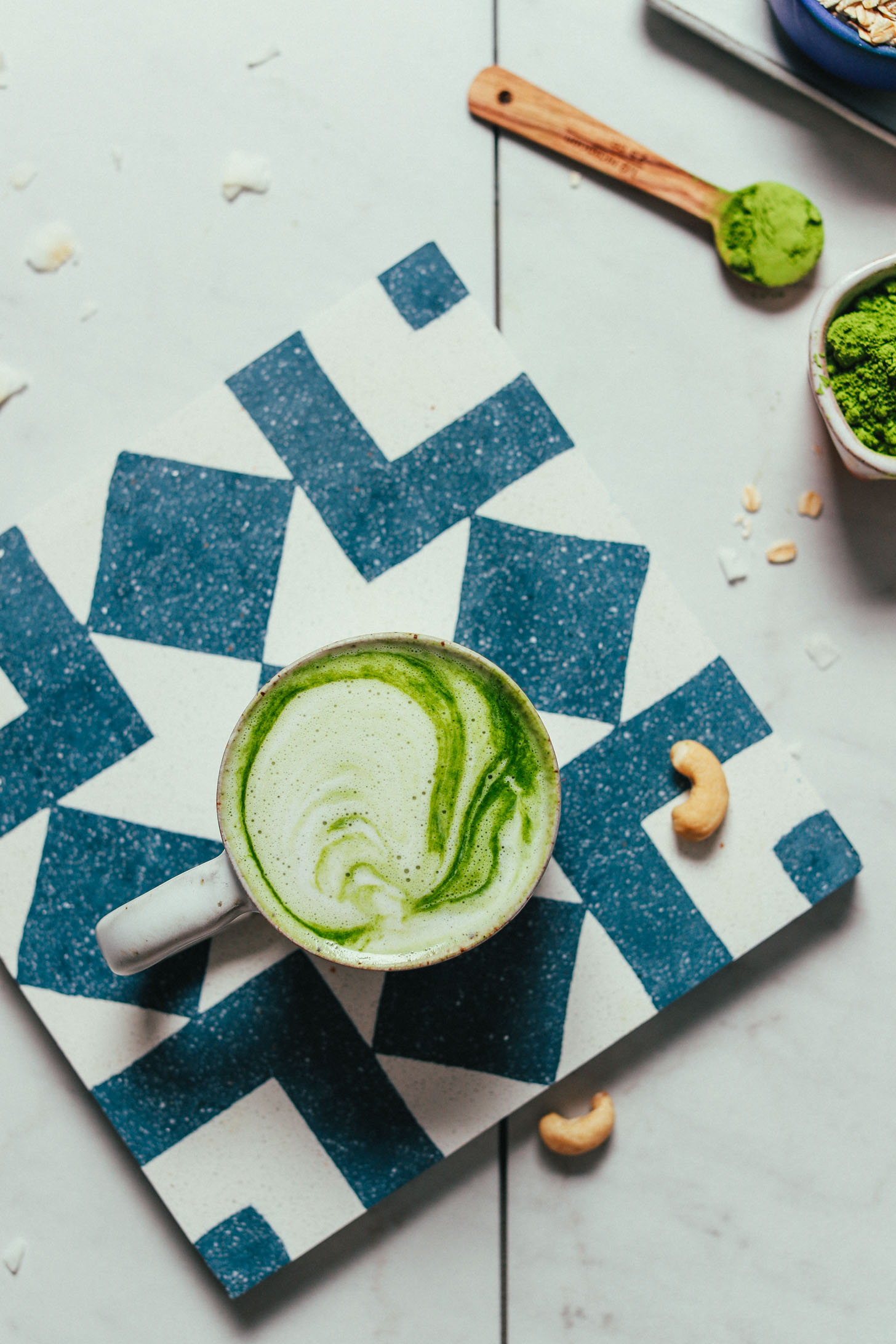
Main Differences Between Matcha & Moringa
Flavor
When it comes to flavor, in our opinion, matcha wins out. Moringa has a similar but slightly more spicy, pungent flavor than matcha. However, over time the flavor grows on you!
Caffeine Content
Unlike matcha, moringa is caffeine-free. But based on personal experience, matcha is a gentler source of caffeine than coffee (we’ve noticed there’s no head rush or jitters with matcha — it’s a smoother uptick and energy without the crash).
If you’re wanting to wean off of coffee, we’d suggest starting with matcha and then transitioning to using half matcha/half moringa and eventually just moringa.
Nutrients
According to moringa supplier Kuli Kuli, moringa contains more fiber, protein, calcium, iron, vitamin A, vitamin C, and vitamin E than matcha. But in the battle of matcha vs. moringa, matcha wins when it comes to the antioxidant EGCG and the calming amino acid L-theanine (moringa doesn’t contain either).
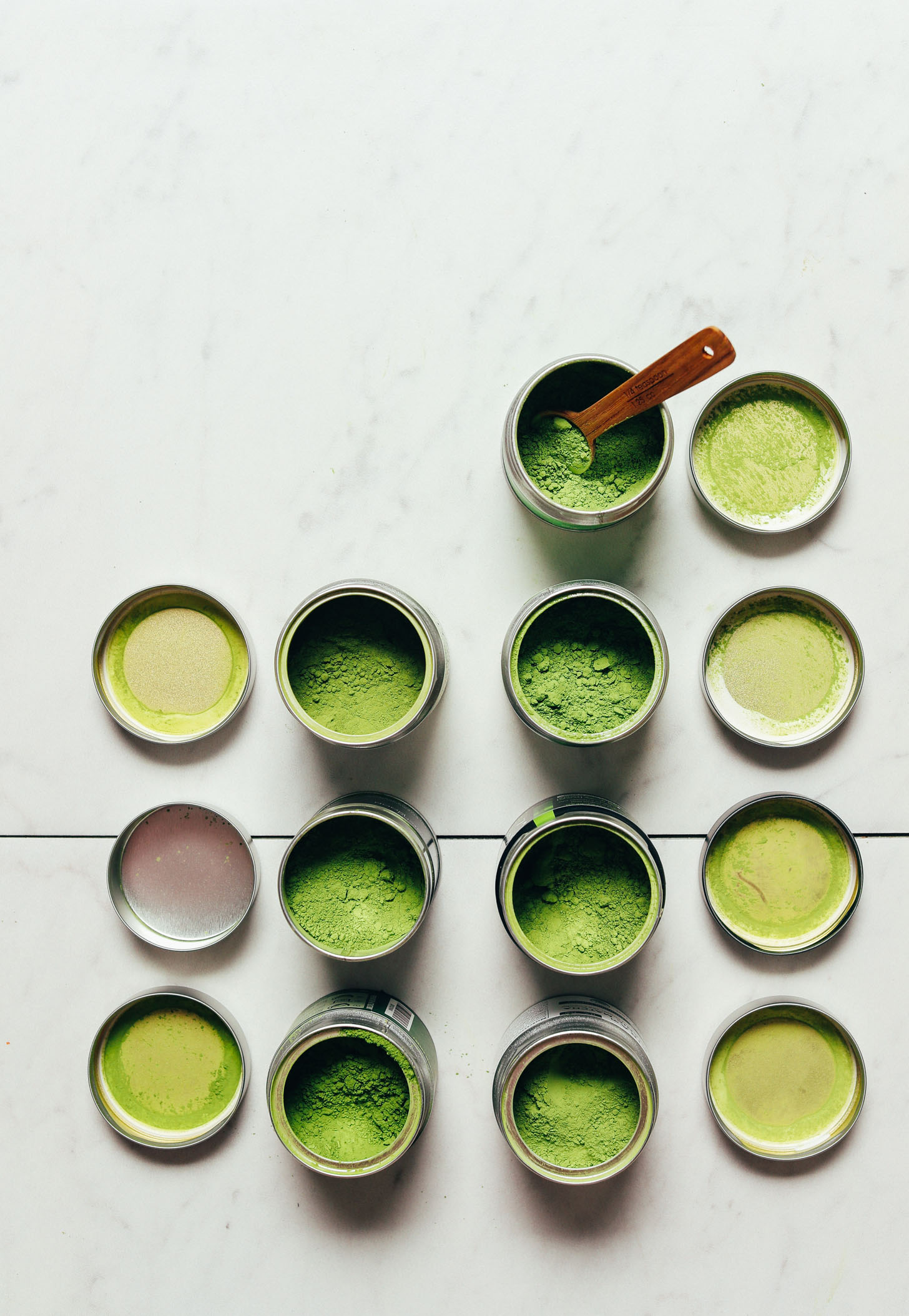
Which Brands to Buy?
It’s important to note that not all matcha and moringa powders are of the same quality. Different brands can vary in flavor, texture, and most noticeably, color vibrancy (which indicates antioxidant potency). If you’re new to matcha or moringa or wanting to know the best brands to buy, make sure to check out our unbiased Matcha Review and Moringa Review!
Matcha Recipes
Matcha can be used in tea lattes, smoothies, desserts, snacks, and more!
Moringa Recipes
Moringa makes delicious lattes and also works well in nearly any recipe that calls for matcha. You can also try adding a half teaspoon to smoothies, such as our Mango Ginger Kale Green Smoothie or Creamy Zucchini Blueberry Smoothie.
If you give any of these recipes a try, let us know! Leave a comment, or take a picture and tag it #minimalistbaker on Instagram.
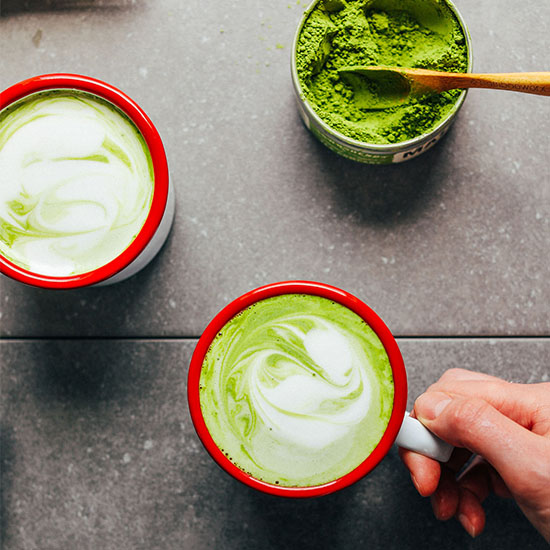
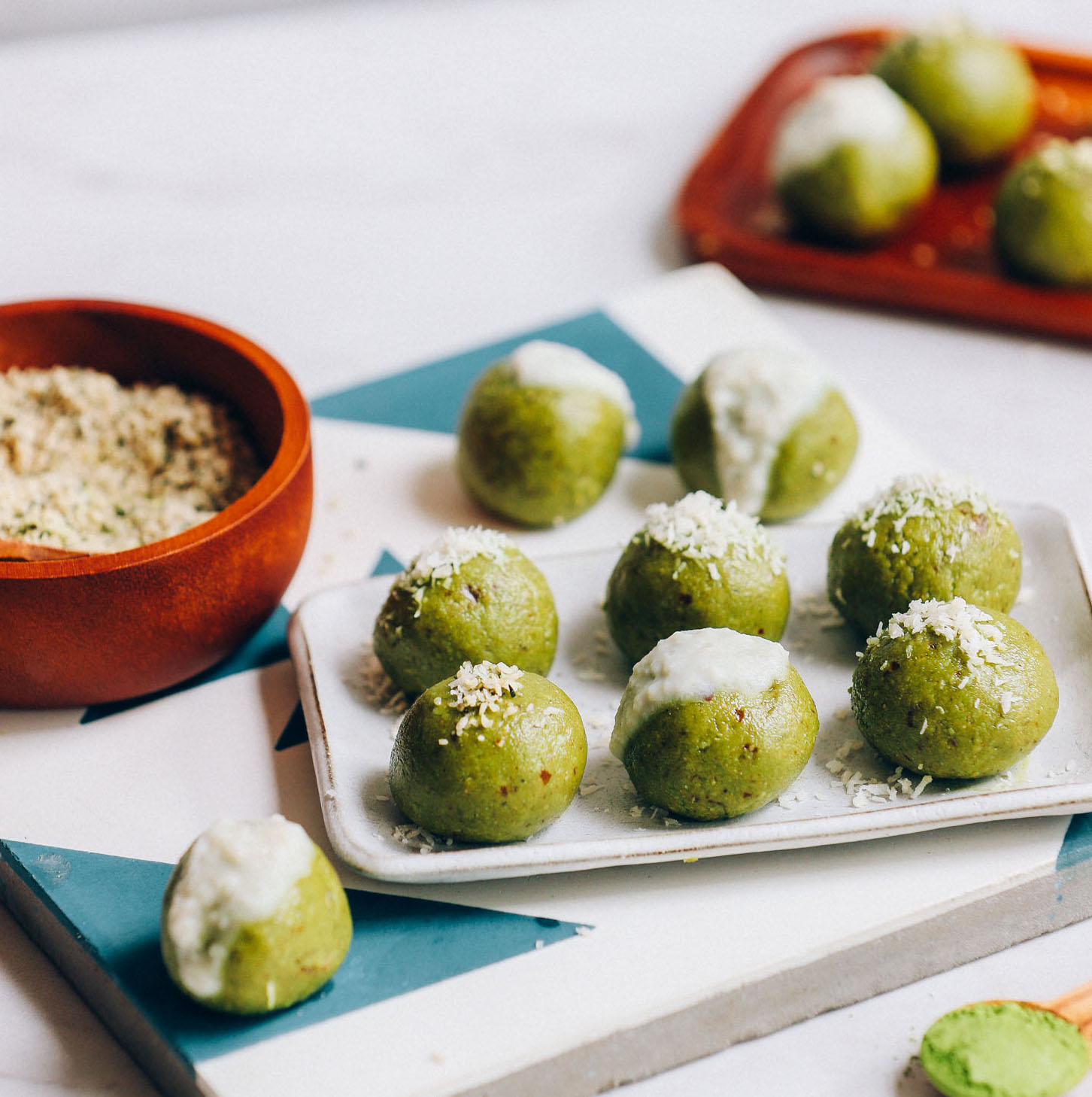
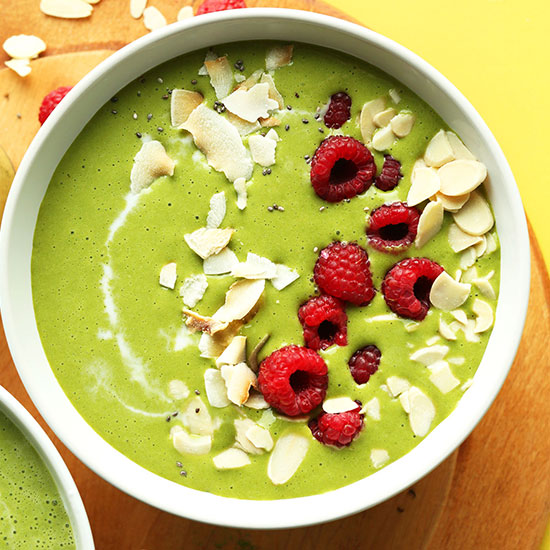
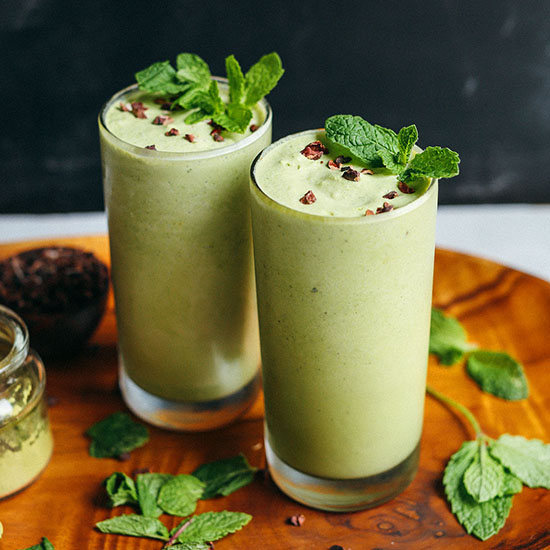
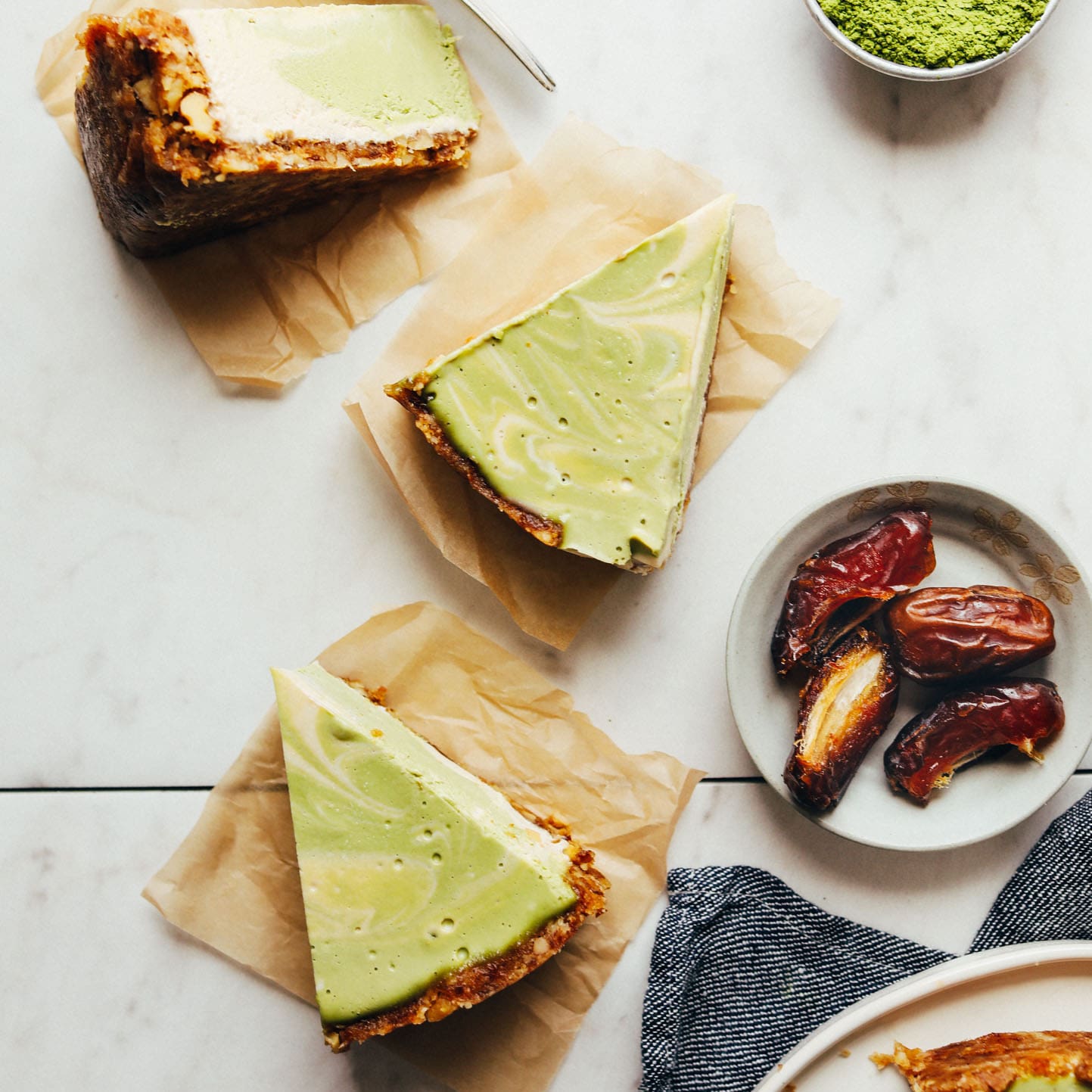
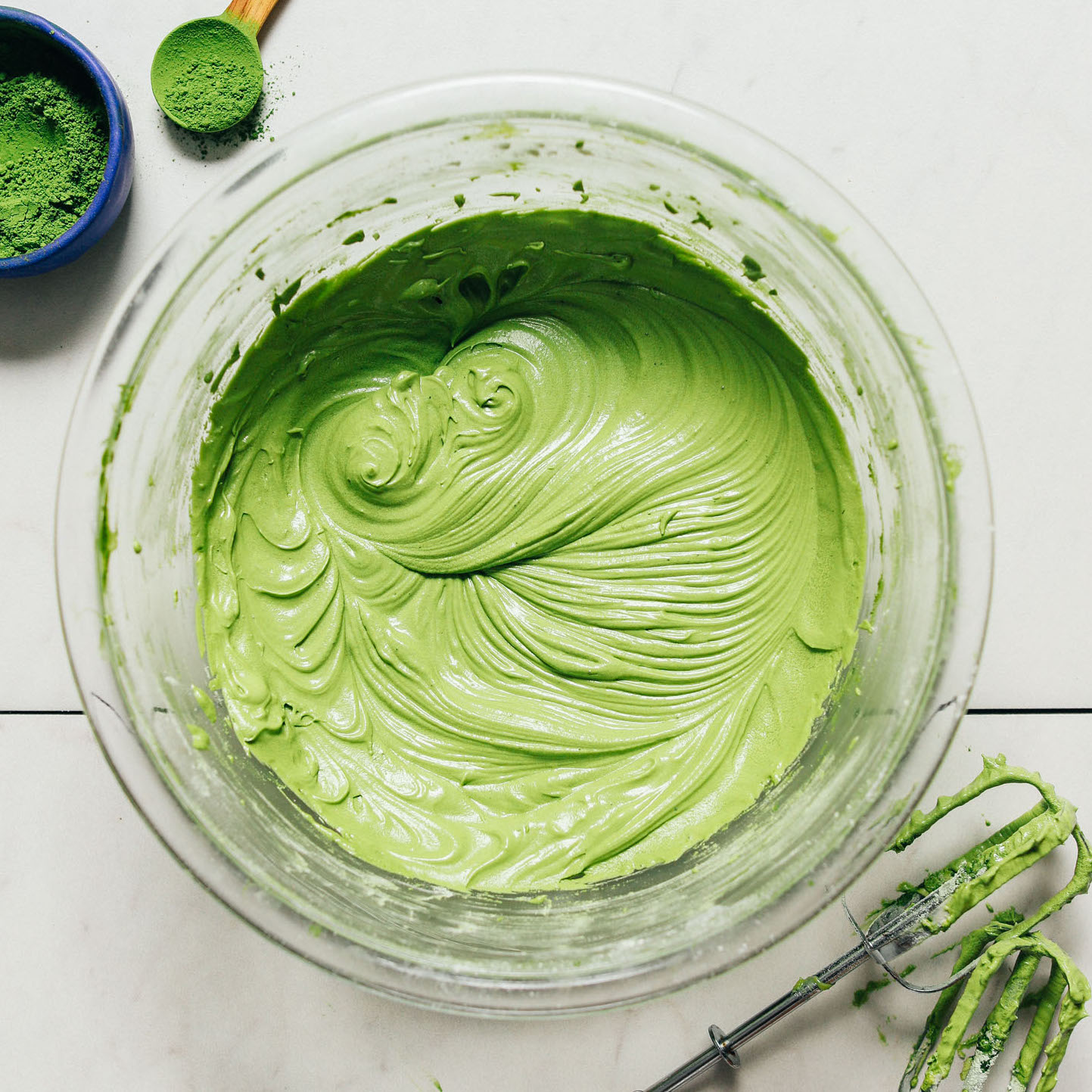
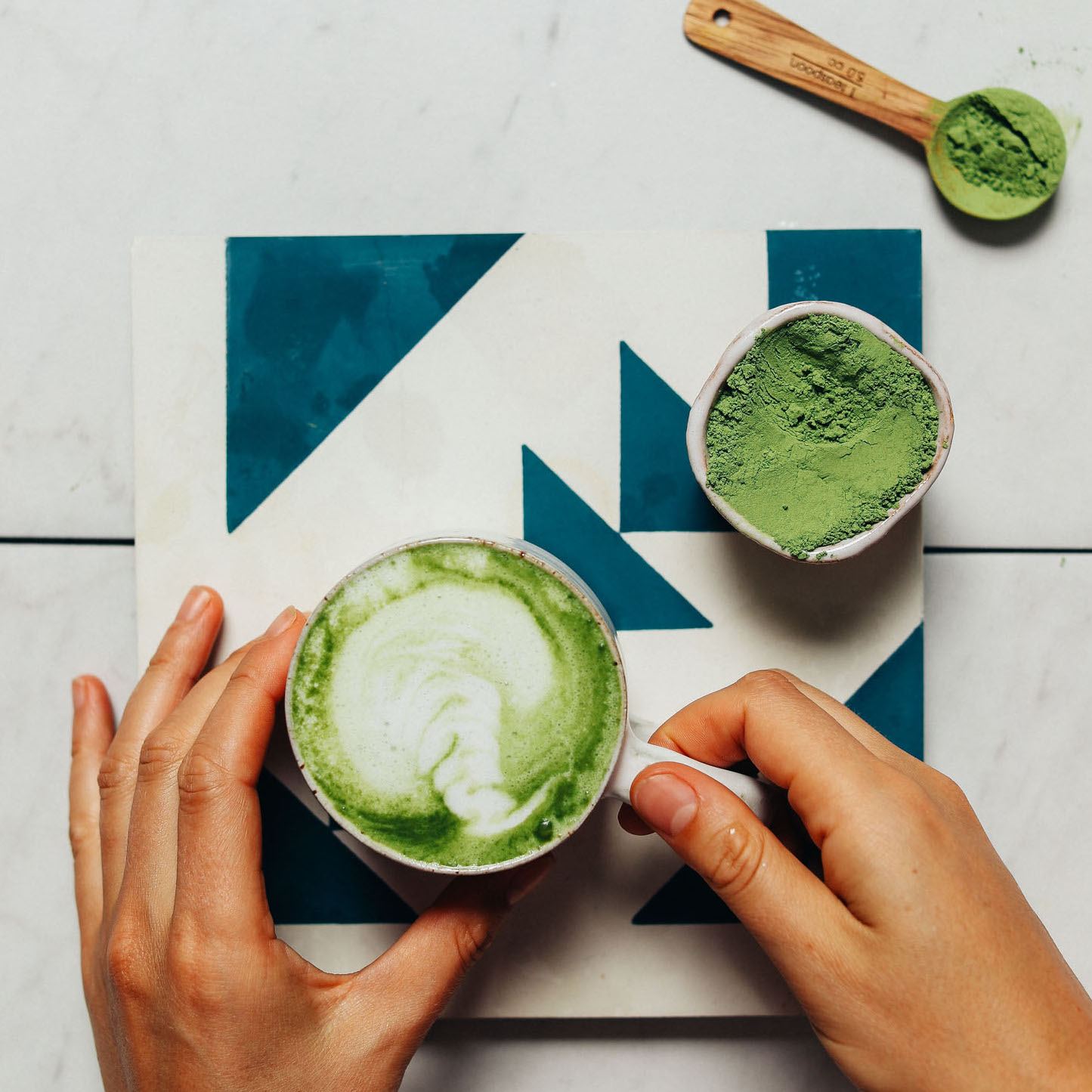
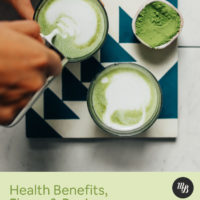
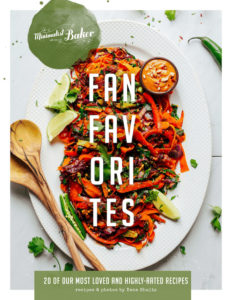
ANNA says
ICED FRESH MORINGA TEA RECIPE (makes 1 gallon)
6 cups firmly packed fresh moringa leaves
1 5″ stem fresh ginger root
1/2 cup lemon juice
Sweetener (optional)
1. Scrape ginger root, cut up and pulverize in food processor
2. Place moringa leaves and ginger in a lidded pot, cover with water and heat to boiling, cover pot, reduce heat and simmer for 5 minutes.
3. Let sit covered overnight.
4. Strain through sieve into bowl, squeezing out all the juice.
5. Pour into gallon jug, top up with water and add optional sweetener.
6. Refrigerate.
If you have a garden, add the leftover moringa/ginger to your soil or composter!
That sounds so lovely, Anna! xo
Michael says
Hi,
I love your website and the work that you put into it. After reading up on matcha, I went to a few specialty websites. In addition to learning the technique, I also learned that there really aren’t designations of “ceremonial” and “culinary” in Japan; just higher quality (as for drinking) and lower quality (as for using in food recipes). Care to comment?
Thank you.
Hi Michael! That’s an interesting point. We largely made that distinction because that’s what consumers most often find when buying matcha online or in stores.
Arthi says
Hello,
Thank you for the informative article. However, I wanted to highlight that the flavour between Matcha and Moringa is not comparable like-for-like, and the flavour section of this article seems to have been written from the context of tea/ drinks and desserts only.
Moringa works very well in Savoury dishes, if you look at it’s traditional use in Indian cooking. I make Dal with Moringa leaves which is delicious, but I also add powder sometimes as its more readily available in western countries. I hope you try it!
Thanks for sharing! I find them quite similar (that is, when you have high quality brands of each). But I love your suggestions for savory applications! Thanks, Arthi.
Lefke says
I have both matsa and motinga in my fridge gor over 3 years.
I got sick one time and eversince I have been scared to ingest them again.
My question is, should I throw the packages away or are they still safe to use?
Thank you,
Lefke’
If you’ve had them for that long, I’d say it’s time to get some new!
Kristin says
Awesome write up! Check out Hawai’i grown moringa at Maruyama/Jones farm. They have a matcha moringa blend so you don’t have to choose. It is my go to afternoon pick me up. I am not affiliated with them just believe in the product and supporting small businesses. Best!
Thanks for sharing, Kristin!
Hannah says
I really respect the work and effort that y’all put into centering health benefits of various foods. However, it was so jarring to see “anti-obesity” touted as a health benefit akin to cancer prevention. The science behind weight I has precarious roots at best (well documented as purposefully and negatively effecting women, especially Black women—Fearing the Black Body speaks for his evocatively and thoroughly). Being fat is not a singular cause of any kind of adverse health problems, because health exists at every size. Would you use the language of being anti-fat on this platform? Probably not because I think you wouldn’t want to seem judgmental or insensitive. The word obesity might be medical in nature but it’s not a neutral or amoral term. I encourage you would keep that, as well as your fat readers and readers who struggle with EDs, in mind in the future as you share health and wellness information. I want to add this isn’t an attempt to “cancel” MB or be a “snowflake” but I genuinely believe you care about people’s health and bodies and hope you would care about this feedback.
Hi Hannah, thanks so much for this thoughtful feedback! We drew that terminology directly from the research linked in that sentence, but definitely understand how that could be considered offensive. We will take another look and modify. Thanks again for sharing!
Jibs says
I agree yo can have people who are fat and healthy and those that are thin on the outside,but fat inside.
Fat around the waist and stomach is a sign of fatty liver and is also people with fat in that area are more likely to develop diabetes, heart conditions metabolic disorders to name a few.
However, obesity is an ever increasing problem.
People with poor diets and eating habits do need to take notice.
If you are like me that fasts regularly, eats very health well proportioned meals, has healthy blood sugar levels ,but remains overweight due to medical condition then you can take comfort in knowing you are healthier than many
Melanie says
Hi Dana/MB Team,
I just wanted to say a quick thank you for your kind and actionable (? maybe not the right word) response to Hannah, who brought up a really great point. The fact that you not only listened, but went in and modified your original post, speaks to the kind of atmosphere you’ve created here at Minimalist Baker. As a longtime reader, I appreciate it so much.
Thanks again! And I’m looking forward to trying out moringa sometime soon :)
Thanks for your kind words, Melanie! xo!
Veronica Fox says
Thank you so much for clear information and for your unbiased reviews of the best Matcha and Moringa brands. The lack of bias (with no commissions) is really helpful. V
xo!
Pedro says
Wow, wow, simply… W.O.W., You guys have the most beautiful photos for your Matcha/Moringa finished recipe creations. I can’t wait to do this recipes. Fingers crossed, I don’t think they’ll come out dazzling like yours.
Thanks
xo!
Susan Cunningham says
I love adding moringa powder to the blueberry smoothie, it is delicious! My favorite moringa powder is True Moringa. It tastes great and I love the company because they work directly with 5000 small family farmers in Ghana and have planted over 2 million moringa trees. I am looking forward to trying the Moringa Latte. Thank you so much for all of the great recipes.
Lovely! Thanks for sharing, Susan!
Heather says
Thanks very much for this article; I have heard a lot about matcha, but not ever anything about moringa so am interested to learn more and try it! Thanks again, I’m glad I found this site on a little thing called the internet. :)
We’re happy you’re here! Let us know if you try it!